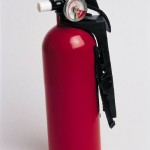Two Southern Maine families were startled awake in the middle of the night by the smell of smoke, and the nightmare of a fire. Fortunately, no one was hurt in either case, but there was extensive damage to their properties. In each case, the fire started in a garage.
Fire damage is covered by Maine homeowners insurance. Damage to vehicles is not. To have vehicle damage covered, You need to purchase “other than collision” coverage on a Maine auto insurance policy. Hopefully, both of these families did have insurance to help them rebuild their homes and replace their vehicles. Of course, the best fire insurance is of all is prevention and avoidance. Here are a few tips to help prevent garage fires and to reduce damage if one should occur.
Fire Needs 3 Things to Exist
Fire can not exist without oxygen, heat and fuel. If you can prevent those three from being together at the same time, you’ve greatly reduced your fire risk. Here are a few tips to help improve your chances.
Store Items Safely
- Allow gasoline-powered tools to cool completely before putting them away. Store them a safe distance from combustibles. Remove remaining grass from mowers, line trimmers, etc. before storing them.
- Never use grills, outdoor fryers, or any other cooking appliance in your garage.
- Store combustibles away from any source of heat.
- Use a metal cabinet with a closed door to store flammables like gasoline, wood finishes, spray paint or thinner.
Get Proper Safety Equipment

At a minimum, your garage should have a fire extinguisher. It’s also a good idea to have a smoke detector in the garage, especially if it’s attached to your home. Your town or city may have other codes or ordinances. Check with your local Code Enforcement Department.
Use Safe Workshop Practices
- Sweep wood chips and sawdust immediately after cutting or sanding wood.
- Seal paint cans and containers of finishes and solvents, and store them away from flammables, preferably in a metal cabinet.
- Dispose of oily rags in a steel bucket with a closed lid. If you need to re-use them, you can also hang them on a line with good separation between them, far away from any heat source.

